Guards Say Iran's Missiles, 'Sphere Of Influence' Are Red Lines
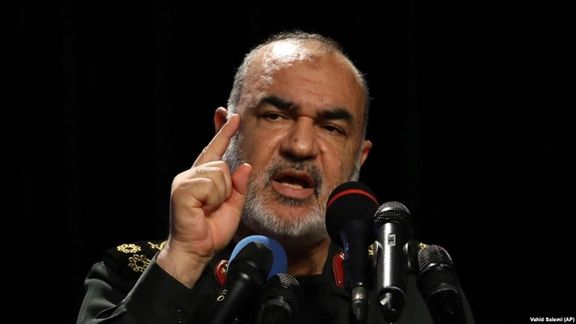
Iran’s Revolutionary Guard says its missile program and its sphere of influence in the countries of the region are the redlines that won’t change.

Iran’s Revolutionary Guard says its missile program and its sphere of influence in the countries of the region are the redlines that won’t change.
The Islamic Revolution Guards Corps (IRGC) made the remarks in a statement issued on Thursday, warning that Iran will give a destructive response to the “enemy’s slightest move” against the country.
“Iran’s missile power, popularity, and regional sphere of influence are associated with the IRGC”, the statement said, adding that it “will give categorical and destructive response to even the smallest mistake of the evil and adventurist enemy against the Islamic homeland”.
The terse statement came as one year of talks to restore the 2015 nuclear deal known as JCPOA have reached a deadlock over Iran’s demand for the United States to delist the IRGC as Foreign Terrorist Organization (FTO).
The statement went on to say that Iran never defines its deterrence “according to the aspirations, desires and wishes of the rulers of the White House and their evil allies, and will not change it under their pressure, threat or evil media propaganda.”
Earlier in the day, IRGC commander Major General Hossein Salami also boasted about the the combat power of IRGC forces -- especially those deployed to the country’s key islands in the south -- urging the Persian Gulf littoral states to end their dealings with Israel.
The saber-rattling by the IRGC follows recent media reports that an air defense pact between Israel and friendly regional countries is in the works to confront threats posed by Iranian drones and missiles.
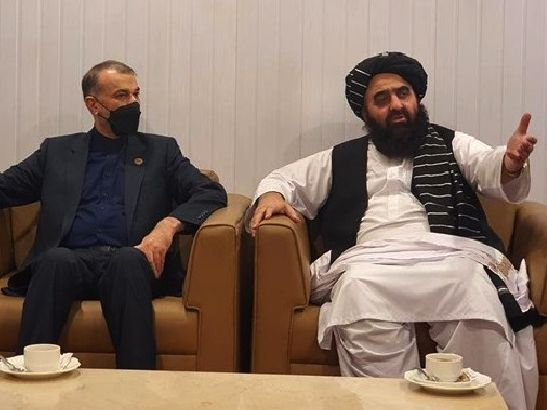
While many express shock by how Iran on Tuesday pepper sprayed women who wanted to watch a football match, its foreign minister has urged the Taliban to respect women’s rights.
Hossein Amir-Abdollahian made his remark during a meeting with his Taliban counterpart Amir Khan Muttaqi in China, on Thursday, where foreign ministers of Afghanistan’s neighboring countries had gathered.
Amir-Abdollahian called for women’s right to education at all levels and their participation in different sectors of the society.
“The role of women in Afghanistan is very important to us... Islam recognizes the presence of women in various fields as their inalienable right,” he said.
In reaction to Amir-Abdollahian’s remarks, senior Israeli diplomat Joshua L. Zarka posted a tweet in Persian, calling it “utmost hypocrisy”. “What do Iranian and Afghan women think about the role you ‘give’ them?”
On Tuesday security forces denied women entry into a stadium in Mashhad to watch a FIFA World Cup qualifier between Iran and Lebanon and used tear gas and pepper spray to disperse them.
Mashhad is home to numerous hardliner clerics who are against women’s presence in male dominated venues. Firebrand representative of the Supreme Leader in the city, Ayatollah Ahmad Alamolhoda has been banning concerts and cultural events for years.
Other than the Taliban regime in Afghanistan, Iran is the only FIFA member country to bar women from football stadiums to watch men’s matches.
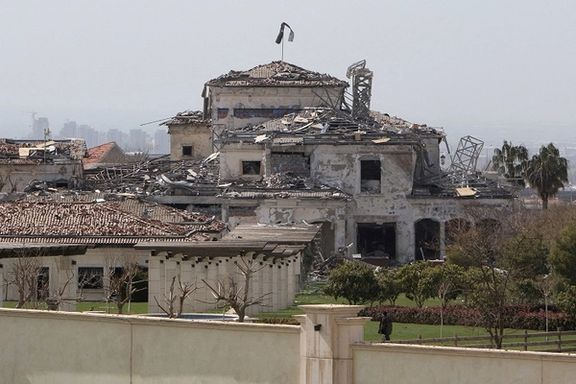
Two Republican senators have joined a growing list of US lawmakers in calling for an end to the nuclear talks with Tehran following an Iranian missile attack in northern Iraq earlier this month.
“It should be a deal-breaker rather than a ‘game, set, match’. There should be no negotiations”, Senator Tommy Tuberville of Alabama told Iran International on Wednesday.
Also speaking to the television station, Senator Josh Hawley of Missouri, expressed hope that “a deal with Iran…would never happen”, and said US sanctions against Iran must not be “lifted or changed in any way”.
In a major escalation of tensions in the Middle East, ballistic missiles on March 13 landed near the US consulate building in Erbil.
Iran’s Islamic Revolution Guards Corps (IRGC) claimed responsibility for the strikes, saying it targeted Israeli "strategic centers" in the capital of Iraq's semi-autonomous Kurdish region.
In addition to the Erbil attack, Iran-backed Houthi rebels launched a fierce drone and missile attack on Saudi Arabia’s oil installation in Jeddah on March 25 that ignited a large blaze. US National Security Advisor Jake Sullivan condemned the attack blaming Iran for supplying weapons to the Houthis fighting a seven-year war against A Saudi-led coalition.
The attack came as negotiations have taken place in Vienna over the past months to bring back the landmark agreement that Tehran signed with the United States, Britain, France, Germany, Russia, and China in 2015, allowing for the easing of sanctions against Iran in return for curbs on the country’s nuclear program.
Then-President Donald Trump unilaterally pulled the United States out of the deal in 2018, and started reimposing crippling economic sanctions against Iran, while Tehran began rolling back on most of its commitments under the accord.
Tuberville said the Erbil missile attack “sending a false message to us, obviously. If this group (the IRCG) is acting this way now, how they’re going to act after, if we do happen to sign a deal”.
"The Biden administration's idea that it somehow is a good thing to loosen the screws on Iran and to allow them once again to have the chance to run rampant in the region is absolutely, diametrically wrong," according to Hawley,
In response to the Erbil attack, the US administration on Wednesday enacted new sanctions against an Iran-based person and his companies for procuring parts to help Iran's ballistic missile program.
"Iran's ballistic missile-related activities continue to destabilize the Middle East region, and the United States will continue to use every tool at our disposal to disrupt them," Secretary of State Antony Blinken said in a statement.
Tehran on Thursday condemned the new sanctions as a further violation of the 2015 UN Security Council resolution 2231 that enshrined the landmark nuclear agreement, JCPOA, between Iran and World powers. The JCPOA in fact removed international sanctions imposed on Iran for its nuclear program and left other sanctions in place.
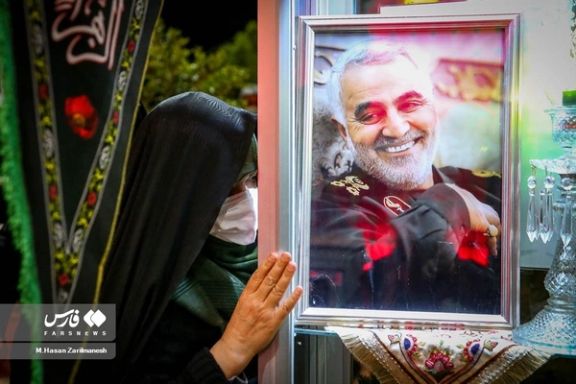
Washington wants Iran to stop threats against US officials for the killing of Ghasem Soleimani if it wants its Revolutionary Guard to be removed from a terrorist list.
The United States will not remove the Revolutionary Guard (IRGC) from its list of Foreign Terrorist Organizations (FTO) unless Tehran pledges to cease its death threats against US officials for the killing of the IRGC's Ghasem Soleimani, a source close to the Vienna talks has told Radio Farda, the Persian service of the US government funded Radio Free Europe.
Iran's Supreme Leader Ali Khamenei, President Ebrahim Raisi, and IRGC officials have repeatedly vowed to avenge Soleimani's death.
“Trump and others like him will be forgotten and lost in the dustbin of history, of course after paying for their crimes in the world," Khamenei said on January 1, two days before the anniversary of Soleimani's killing in Baghdad in January 2020 on former US President Donald Trump's orders.
In a televised speech two days later, Raisi said that "Muslims" would take revenge" if Trump and former Secretary of State Mike Pompeo were not "tried in a fair court for the criminal act of assassinating Soleimani."
The source who spoke on condition of anonymity told Radio Farda that Tehran's last-minute demand for delisting the IRGC is currently the biggest hurdle in the way of an agreement to restore the 2015 Iran nuclear deal, Joint Comprehensive Plan of Action (JCPOA).
Soleimani, who was Iran’s top military and intelligence operator outside its borders, was in charge of supporting and organizing militant proxy forces, including the Lebanese Hezbollah and Iraq Shiite militia groups that have repeatedly attacked US forces.
The European Union's top diplomat Josep Borrel said Monday that talks were stuck by Tehran due to new demands that weren’t part of the JCPOA, such as the status of the IRGC, after a hurdle thrown by Russia was overcome. "It’d be a shame not to reach some sort of an agreement when we're so near to reaching one,” Borrel told the European Parliament
The source also told Radio Farda that the US has asked Iran to pledge that it will not threaten and harm US citizens and facilities in the region.
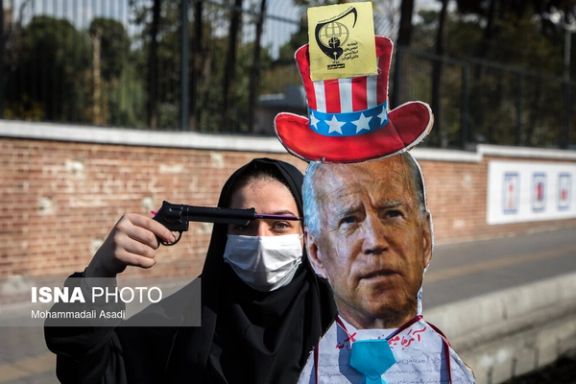
According to Radio Farda's source, Iranian Foreign Minister Hossein Amir-Abdollahian's remarks in an interview Saturday referred to the US condition of not pursuing revenge for Soleimani's killing. "When we say IRGC we mean General Ghasem Soleimani," Amir-Abdollahian said in the interview.
"Regarding the IRGC, what is important is to acknowledge the standing and the central role of the IRGC in our security and defense. [Negotiators] relayed some messages to the US [in this regard]," Amir-Abdollahian said in the same interview.
Trump administration officials have strongly opposed the possibility of the IRGC's delisting. In a joint statement last week, three former senior officials, including former Secretary of State Mike Pompeo, former national security adviser Robert O’Brien, and former director of national intelligence John Ratcliffe said delisting the IRGC would be “a dangerous capitulation" and "a denial of the basic reality that the IRGC's core mission is to spread terror."
“The pursuit of an ill-conceived ‘deal’ should not compel American leaders to acquiesce to the demands of a terrorist regime to deny the truth. American lives are at stake, and this is a time to project strength, not weakness," they said in their statement shared with Axios.
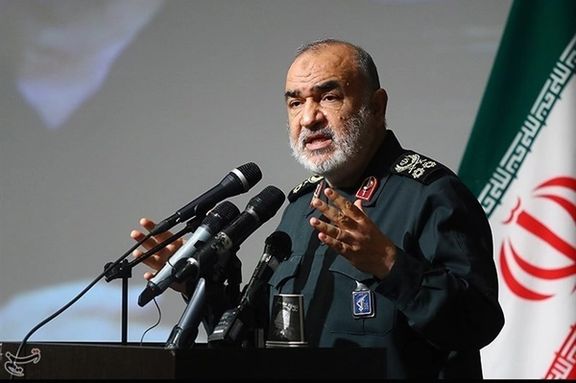
The commander of Iran’s Islamic Revolution Guards Corps (IRGC) has urged states around the Persian Gulf to end their dealings with Israel, alleging that the country’s activities in the region are a cause of insecurity.
“Unfortunately, some countries on the southern side of the Persian Gulf have established political and security relations with [Israel], which poses a serious threat to the security of the region and these states themselves”, Major General Hossein Salami said on Wednesday during a visit to the southern island of Abu Musa, near the strategic Strait of Hormuz.
“We explicitly declare and warn that the continuation of such relations is not acceptable at all,” Salami said, speaking alongside IRCG Navy commander Admiral Alireza Tangsiri.
Salami also praised the combat power of IRGC units, especially those deployed to Iran’s islands in the Persian Gulf, the Strait of Hormuz and the Sea of Oman, as well as the capabilities of the Revolution Guards’ naval forces in the fields of drones, missiles, electronic warfare and submarines, adding that these forces can show timely and effective response to any threats.
The IRCG commander’s comments follow recent media reports that an air defense pact between Israel and friendly regional countries is in the works to confront threats posed by Iranian drones and missiles.
The reports came in the wake of a two-day meeting on March 27-28, dubbed the “Negev Summit”, which brought together the top diplomats of Israel, the United States, and four Sunni Arab states, including the Persian Gulf countries of Bahrain and the United Arab Emirates.
Wrapping-up the landmark gathering in Israel, Israeli foreign minister Yair Lapid announced the participants had decided to make the summit into a “permanent forum” that he said would help confront “our common enemies, first and foremost Iran and its proxies”.

Iranian academic Mohammad Fazeli and reformist political commentator Abbas Abdi have explored the best and worst-case scenarios for Iran as it entered a new year on March 21.
Fazeli, a sociologist who was fired from the Sharif University of Technology in Tehran in January for undermining the party line in his lectures, said "the government's competency, its social capital, and the international situation are three variables that determine the country's economic prospects."
He offered an optimistic and a pessimistic scenario. He ruled out that the government’s poor performance can improve, because a change in the combination of players is out of the question.
President Ebrahim Raisi came to office with the motto of hardliners uniting to run the government and his choice of officials is limited to leftovers of former controversial president Mahmoud Ahmadinejad’s aides.
In the light of public dissatisfaction with the Raisi administration, Fazeli argued that any improvement in the government’s standing should come with a change in its foreign policy to open doors for economic improvement. But so far there is no sign of a shift.
Although the paradoxical formula leaves little room for optimism, Fazeli said that there might be a tentative breakthrough if Iran reaches a nuclear agreement with the West, which would lend a new lease of life to the economy and help the government, similar to what happened after the nuclear deal in 2015.
Fazeli insisted that the benefits of an agreement would not last long as Donald Trump or someone like him could always win the presidency in the United States. During the short breakthrough, however, the government can put up a show of its competence by controlling inflation and prices, and boost the battered Iranian currency.
Nonetheless, Fazeli said that Iran is a country at the brink. The government needs political courage and honesty to confront interest groups who are used to getting unfair economic advantages.
Fazeli went on to say that the worst-case scenario will occur when government officials adopt policies or make statements that would erode its legitimacy further. The situation will become even worse if negotiations with the West are not fruitful and radicals take the upper hand in the government. This, he said, will lead to protests with unpredictable consequences.
Iran needs ‘a détente’
Meanwhile, Abdi, who regularly writes for Iran's reformist newspapers, said that Iran needs a process of detente in its international relations to reach a long-term solution for its nuclear crisis. However, he expressed doubt that such a change would occur in the new year.
Abdi added that Iran's economic problems need political rather than economic solutions. "We are talking about those political variables that will totally change the government's approach." He added that the key elements affecting Iran's situation include, foreign policy, domestic politics and managerial approaches which are interlinked.
A good solution to the nuclear question can give the economy a boost although its effect may not be as big as it was in 2015. However, a deal on the nuclear issue will not encourage foreign investment because the companies know that the situation may change in two years. Without a fundamental solution to the nuclear program, the economic crises will worsen, Abdi said.
On the domestic front, the hardliners' rise to power is irreversible. But the problem is that coalitions among hardliners are loose and unstable, so there is a chance that political instability and social tensions will rise. The year that just started will be a continued purgatory, he argued.
The managerial approach, which is based on reliance on managers less educated than average Iranians, cannot create any sustainable growth or boost employment. All they can do is wasting resources. This is the Iranian economy's main problem Abdi said, adding that even if nuclear talks lead to an agreement, not much can be done in the absence of good plans, management, and coordination.